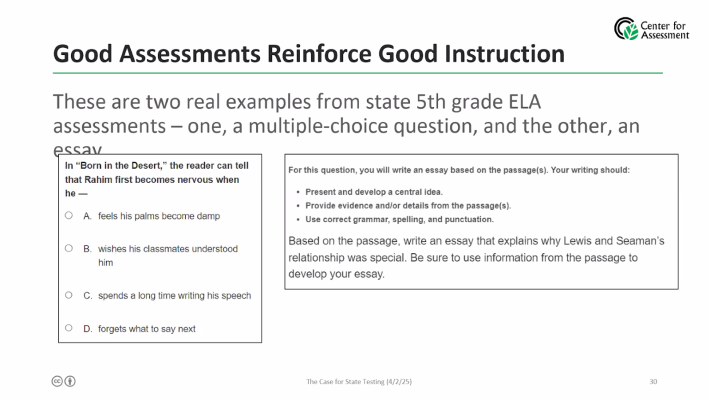The Delta Issue #31
Don’t ask “Should we have state tests?” Instead, ask, “How can we make state tests better?”
Hi y’all, Kunjan Narechania here. On April 2, Jessica Baghian joined Carey Wright and Scott Marion for a discussion hosted by the Center for Assessment about whether states should keep statewide testing even if federal testing mandates end. (Spoiler alert: The answer is yes!)
Here are my 3 key takeaways from the conversation:
1. The question isn’t “Should we keep state tests?” but “How do we keep making state tests better?”
The 2024 NAEP scores gave us the second national snapshot of how student achievement has changed since the pandemic. It not only revealed a decline in scores since 2022, but also an entrenched gap between the 90th and 10th percentiles. We can’t stick our heads in the sand and ostrich our way out of our current educational outcomes. The stakes are too high. Instead of debating whether to keep state tests, we should be taking steps to further improve state assessments.
States should be looking at their assessments and asking themselves:
- Is this worthy of students’ time?
- Do educators know what is on the test? What decisions are they making in response to it?
- And, do parents understand their kids’ results?
2. Good assessments create coherence, reinforce instruction, and signal what states want students and teachers to spend their time doing in the classroom.
When you have kids using strong high-quality instructional materials in the classroom and then make them sit for a simplistic state test, you send a confusing signal to the field on what teachers should spend their time on. Too many state ELA exams look like the multiple choice question on the left, not the more complex question on the right that asks students to formulate an argument and demonstrate complex thinking via writing.

When the standards, curriculum, assessments, and accountability all reinforce the same expectations for learning, instruction improves.
3. States should give parents clearer reports, and release results much faster.
According to Learning Heroes, nearly nine in 10 parents say their kids are at or above grade level in reading and math, because most kids earn good grades. However, when parents are exposed to assessments that show their child is actually below grade level, they take action — for example, they might talk to their child’s teacher or find a tutor.
A number of states (shout out to Arkansas, California, Texas, and Virginia) are partnering with Learning Heroes to ensure assessment data is communicated effectively to parents — and we need more states, and, frankly, assessment vendors, making parent communication a priority. More states should follow.
Relatedly, the speed of results matters. Way too many states don’t put out state test results until fall, a full six months after the test took place. States must move faster so students, parents, teachers, and taxpayers get the timely results they’re due. We should be aiming to release results within 30 days of testing.
Resources 🔗
The Case for State Testing (NCIEA, 2025)
B-Flation: How Good Grades Can Sideline Parents (Learning Heroes, 2023)
What Might Happen to State Tests Under the Trump Administration? (Education Week, 2025)
Let’s Get Muddy
Did you join us for the webinar on Wednesday? What was your number one takeaway?





